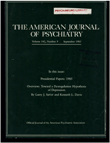Amish Study, III: the impact of cultural factors on diagnosis of bipolar illness
Abstract
In the Amish Study of affective disorders, 79% of the 28 active bipolar I patients, diagnosed according to Research DIagnostic Criteria, previously had received hospital record diagnoses of schizophrenia. Both cultural and clinical factors hindered correct diagnosis, and cultural influences particularly complicated the interpretation of the manic symptoms of grandiosity and excessive involvement in activities. Other factors central to misdiagnosis were form of thought (flight of ideas), content of thought (grandiose and religious delusions), paranoid features, and the failure to recognize the presence of a manic syndrome.
Access content
To read the fulltext, please use one of the options below to sign in or purchase access.- Personal login
- Institutional Login
- Sign in via OpenAthens
- Register for access
-
Please login/register if you wish to pair your device and check access availability.
Not a subscriber?
PsychiatryOnline subscription options offer access to the DSM-5 library, books, journals, CME, and patient resources. This all-in-one virtual library provides psychiatrists and mental health professionals with key resources for diagnosis, treatment, research, and professional development.
Need more help? PsychiatryOnline Customer Service may be reached by emailing [email protected] or by calling 800-368-5777 (in the U.S.) or 703-907-7322 (outside the U.S.).



